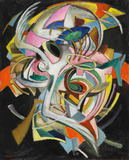Oscar Zügel: Victory of Justice (1933-1936)
Oscar Zügel: Victory of Justice (1933-1936)
Ein eitler, verbrecherischer Spekulant hat mit der deutschen Kultur Schindluder getrieben. – Ich weiß nicht, was schwerer ist, mitten im Elend zu stehen, oder aber mit gebundenen Händen Zuschauer zu sein von einem Vorgang, der einem eine geliebte Heimat, eine von mir hochgeachtete Kultur in das Generalverderben wirft.
[A vain, criminal speculator has played fast and loose with German culture. – I don’t know which is harder, standing in the midst of misery or looking on as a bystander with hands bound, watching as the beloved homeland throws the culture I prize so highly onto the pile of overall decay. (ed. trans.)]
Oscar Zügel in a letter to his aunt Julie, 5 March 1947
Oscar Zügel called the painting Victory of Justice his fateful painting. It arose between 1933 and 1936, and as such it is a work of both “inner exile” and actual exile. Over the course of its execution and with changes in the image’s message it bore different titles: 1. Destruction of the city of Stuttgart; 2. The Fall of Hitler, the Unlucky Star; 3. Victory of Justice.
In 1934 the work brought Zügel an official indictment for the first time, the Nazis seeing it as an attack on the system. For them, it revealed Oscar Zügel to be an opponent of that system. In Spanish exile in 1936 came a further charge, this time from the Spanish Republicans. However they saw the later addition of a cannonball with an inverted swastika and the standard of the Italian fascists as an endorsement of Nazism. The Girona court only dropped the charge due to the support of British writer Nancy Johnstone, who provided a statement. She was able to convince the court of Zügel’s antifascist views.
This was the first indication of the changing political climate which accompanied the Franco-Hitler alliance. Shortly after, Zügel left Spain to secretly prepare his escape from Germany to Argentina via Switzerland. After his departure his house in Spain was seized. However, fishermen managed to save the painting Victory of Justice, returning it to the artist on his return in 1950.


